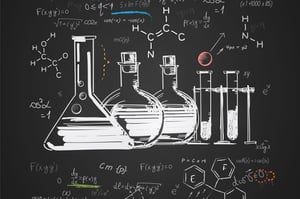The Chemical and Physical Foundations of Biological Systems section of the Medical College Admissions Test (MCAT) is conceptually one of the most difficult sections of...
Acing General Chemistry on the MCAT
 Reviewing and relearning a multitude of topics and subjects for the MCAT is no easy feat for most students. Many find general chemistry especially burdensome since it is usually taken freshman year and well forgotten by the time MCAT preparation comes around. This article explores various tips useful for brushing up on your chemistry knowledge and studying for it as efficiently as possible.
Reviewing and relearning a multitude of topics and subjects for the MCAT is no easy feat for most students. Many find general chemistry especially burdensome since it is usually taken freshman year and well forgotten by the time MCAT preparation comes around. This article explores various tips useful for brushing up on your chemistry knowledge and studying for it as efficiently as possible.
How important is general chemistry?
General Chemistry makes up about thirty percent of questions on the Chemical and Physical Foundations of Biological Systems Section of MCAT and five percent of all questions in Biological and Biochemical Foundations of Living Systems. It is essential to scoring well on the test and getting into a medical school.
How do I know what general chemistry topics to study?
AAMC website has a section (“What's on the MCAT Exam?”) that lists all the topics on each section of the MCAT. Some of the high yield topics are: acids and bases, electrochemistry, chemical equilibria, and stoichiometry. Studying all the topics thoroughly is essential to scoring well on the exam, and being prepared for any question given on the test.
How should I study general chemistry?
Making a list of topics will help with feeling less overwhelmed and more organized. You can begin by reviewing a topic either using a book or watching Khan Academy videos (Khan Academy has a section dedicated to MCAT and all its topics). Most of the time, however, must be spent on practicing problems. Practice does make perfect! Many students make a mistake of spending days and months going over topics, but not doing much practice. Solving problems and going over mistakes is vital to scoring well on the exam. All the tests, problem sets and flashcard problems released by AAMC should be practiced prior to the test date. However, it should be noted that practicing AAMC problems is not enough and other sources should be used for further preparation.
Also, it is important to make a list of chemistry formulas and constants (speed of light, Plank’s constant, ideal gas constant) and memorize them before the test. Writing out all the formulas from memory every morning is a good way to start the day!
Watch out for units!
Got stuck on a question? Units will often come to the rescue. Chemistry is all about units. Units will help you remember many formulas and to know whether division or multiplication is needed. Let’s say a question asks to find the amount of heat needed to increase the temperature of 20g of aluminum from 30 to 45 given that the specific heat capacity of aluminum is 0.902 J/g. Specific heat capacity has the unit of J/g. Thus, heat (Joules) can be found by eliminating grams and since two temperatures are given, it can be inferred that a change in temperature is needed: 45-30 = 15. To cancel the units of g and and get Joules, specific heat capacity must be multiplied by mass (in grams) and change in temperature (in Celsius).

Brush up on your math skills.
Solving most chemistry problems and coming up with a correct answer requires math. A calculator is not allowed on the MCAT and, therefore, students should improve their math skills and become comfortable with multiplying and dividing very complex numbers. Converting most numbers into scientific notation will help make division and multiplication very easy. Let’s say we need to divide 0.00805 by 403. At first, this task might seem a little daunting, but not after we convert both numbers into scientific notation!

Learn to analyze graphs and tables.
Most of the time, not all the needed information and numbers are given in the question stem. Remaining components needed to solve the problem can be found in the passage and through the interpretation of graphs and charts. Almost every passage will have a chart, graph, or table that needs to be analyzed. Reading the name of the x-axis and y-axis as well as the title and legend will help you understand the information the graph is trying to convey. For chemistry questions, oftentimes, missing components are found on the charts and graphs presented in the passage. Thus, it is very important not to overlook these essential pieces of information.
Conclusion
Using the tips and tricks listed above should help you review and practice general chemistry productively. It’s time to ace the MCAT and become an amazing doctor! Are you ready?
About the Author
Mayya Glushankova is the Founder and Head Tutor at Transformation Tutoring LLC as well as a chemistry enthusiast. At Transformation Tutoring, we specialize in Science and Math tutoring on all levels. Our tutors have many years of experience and truly care about the success of their students. We have helped hundreds of students successfully complete college and prepare for the GRE, MCAT and DAT. Many are now enrolled in top schools such as Columbia Medical School and NYU Medical School and participating in well-known graduate programs in the medicine and health fields. Please call 646-407-9078 or visit www.transformationtutoring.com for more information.
